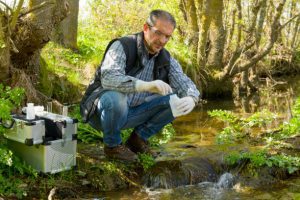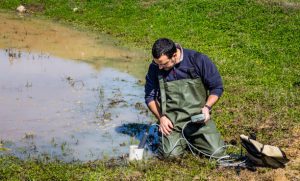When we think about careers in agriculture, food, and natural resources, most of us think of farming.
But the truth is that farming is only one of many careers in this industry!
In this article, I’ll go over some of the top careers that fall into this category (some of which might surprise you!) and reasons to consider them for yourself.
1. Organic Farmer

Why Become an Organic Farmer?
Farming probably seems like one of the most obvious careers in agriculture, food, and natural resources.
While farming is a challenging job, there are some real benefits to going into the industry!
Agriculture has extremely high job security, and many farmers enjoy the freedom of working for themselves and setting their own schedule.
| Organic Farmer Key Stats | |
|---|---|
| Avg. Salary / year | $97,240 |
| Avg. Pay / hour | $46.75 |
| Education | 2-4 Years |
| Job Outlook | 0% |
| Total Employed | 5,910 |
Read the full career guide: How to Become an Organic Farmer
2. Veterinarian

Why Become a Veterinarian?
Veterinarians enjoy rewarding careers that pay well and allow them to do positive work that they care about.
The industry has a median salary of $99,250.
Even the lowest-paid veterinarians earn above $75,000 annually.
The job is also interesting and fast-paced with a high level of job security.
Many veterinarians can set their own schedules!
| Veterinarian Key Stats | |
|---|---|
| Avg. Salary / year | $140,270 |
| Avg. Pay / hour | $67.44 |
| Education | 3-4 Years |
| Job Outlook | 18.8% |
| Total Employed | 80,630 |
Read the full career guide: How to Become a Veterinarian
3. Veterinary Technician

Why Become a Veterinary Technician?
Veterinary technicians assist veterinarians.
They are responsible for completing animal blood tests, X-rays, and other tests.
While vet techs earn less than veterinarians, one upside is that the position requires less schooling.
You only need an associate’s or bachelor’s degree and a technical training program.
The job outlook in the industry is also excellent!
| Veterinary Technician Key Stats | |
|---|---|
| Avg. Salary / year | $46,280 |
| Avg. Pay / hour | $22.25 |
| Education | 3-4 Years |
| Job Outlook | 20% |
| Total Employed | 131,320 |
Read the full career guide: How to Become a Veterinary Technician
4. Toxicologist

Why Become a Toxicologist?
Toxicologists study chemicals to determine their toxicity to humans and animals.
This includes fascinating careers in forensic science, clinical research, drug information, and medicine.
While toxicology requires extended schooling, it paves the way for fast-paced, exciting careers.
Most of these have high job security and higher-than-average salaries.
Projected job growth in toxicology is steady.
| Toxicologist Key Stats | |
|---|---|
| Avg. Salary / year | $61,300 |
| Avg. Pay / hour | $29.47 |
| Education | 4+ Years |
| Job Outlook | 8% |
| Total Employed | 55,640 |
Read the full career guide: How to Become a Toxicologist
5. Biochemist

Why Become a Biochemist?
Biochemists study cells and chemical makeup.
This means they play an important role in medicine, pharmaceutical research and development, chemical engineering, forensic science, and agricultural science.
These career paths require extensive study!
But they also open the way to a wide variety of industries and experiences.
Most of these pay extremely well and offer solid job security.
| Biochemist Key Stats | |
|---|---|
| Avg. Salary / year | $115,570 |
| Avg. Pay / hour | $55.56 |
| Education | 4+ Years |
| Job Outlook | 11.4% |
| Total Employed | 34,520 |
Read the full career guide: How to Become a Biochemist
6. Ecologist

Why Become an Ecologist?
Ecologists gather data about environments and their relationship with the living things they contain.
This means they play a vital role in environmental science and conservation!
Jobs in ecology include research roles, conservationist or restorationist, marine biologist, and many more.
Many of these careers offer rewarding work and significant job security due to the niche qualities of their industries.
| Ecologist Key Stats | |
|---|---|
| Avg. Salary / year | $88,640 |
| Avg. Pay / hour | $42.62 |
| Education | 4+ Years |
| Job Outlook | 11% |
| Total Employed | 84,930 |
Read the full career guide: How to Become an Ecologist
7. Microbiologist

Why Become a Microbiologist?
Microbiologists collect data on the tiny organisms that affect the world.
They can work in many different industries, from pharmaceuticals to farming, research, quality control, or immunology.
Becoming a microbiologist opens your career up to many different types of work.
Most of these offer competitive salaries and a high level of job security.
| Microbiologist Key Stats | |
|---|---|
| Avg. Salary / year | $95,200 |
| Avg. Pay / hour | $45.77 |
| Education | 4+ Years |
| Job Outlook | 8.2% |
| Total Employed | 19,760 |
Read the full career guide: How to Become a Microbiologist
8. Botanist

Why Become a Botanist?
Botanists study plants and the processes by which they grow or develop.
Botanists can work in research, on farms, in nurseries or botanical gardens, or as educators.
Being a botanist usually requires a graduate degree, but means having the chance to go into many different jobs, with versatile environments and salaries.
| Botanist Key Stats | |
|---|---|
| Avg. Salary / year | $83,040 |
| Avg. Pay / hour | $39.92 |
| Education | 4+ Years |
| Job Outlook | 7% |
| Total Employed | 16,600 |
Read the full career guide: How to Become a Botanist
9. Floral Designer

Why Become a Floral Designer?
Floral designers or florists create floral arrangements for parties, weddings, funerals, and other services.
Jobs in floral design include working in nurseries, boutiques, education, farming, or delivery.
One of the big benefits of working in this industry is that you don’t need a higher degree to start your career!
Salaries range widely but average $52,979 annually.
| Floral Designer Key Stats | |
|---|---|
| Avg. Salary / year | $37,700 |
| Avg. Pay / hour | $18.13 |
| Education | 6-12 Months |
| Job Outlook | -6% |
| Total Employed | 40,160 |
Read the full career guide: How to Become a Floral Designer
10. Machinist

Why Become a Machinist?
Machinists use tools, programs, and blueprints to help manufacture specialized machines.
To enter the industry, you need a high school diploma and technical training through a vocational program or technical college.
The industry is projected to continue growing steadily throughout the 2020s, promising a good amount of job security for machinists.
| Machinist Key Stats | |
|---|---|
| Avg. Salary / year | $57,390 |
| Avg. Pay / hour | $27.59 |
| Education | 1-2 Years |
| Job Outlook | 3% |
| Total Employed | 298,790 |
Read the full career guide: How to Become a Machinist
11. Welder

Why Become a Welder?
Welders work with metal, often machinery, to manufacture, repair, and maintain parts.
Welding jobs are in high demand and the job outlook is promising, with projected growth going steadily upwards.
Additionally, welders enjoy a high level of job security thanks to the specialized knowledge of their work.
You need a high school diploma and technical certification to become a welder.
| Welder Key Stats | |
|---|---|
| Avg. Salary / year | $55,100 |
| Avg. Pay / hour | $26.49 |
| Education | 0-6 Months |
| Job Outlook | 3% |
| Total Employed | 424,040 |
Read the full career guide: How to Become a Welder
12. Environmental Scientist

Why Become an Environmental Scientist?
Environmental scientists study the environment to help protect the natural world from pollution.
This might mean working with lawmakers, conservationists, waste management, or other entities.
This rewarding career allows you to do important work for the planet and society, while working in an interesting and unique setting.
The median salary of environmental scientists is $73,230.
| Environmental Scientist Key Stats | |
|---|---|
| Avg. Salary / year | $88,640 |
| Avg. Pay / hour | $42.62 |
| Education | 4+ Years |
| Job Outlook | 15% |
| Total Employed | 84,930 |
Read the full career guide: How to Become an Environmental Scientist
13. Zoologist

Why Become a Zoologist?
Zoologists work with wildlife biologists to collect data about animals and their habitats, including how they interact with humans.
Careers in zoology include veterinary medicine, research, zoo curation, wildlife rehabilitation, animal science, education, and more.
This offers the chance for working in a fast-paced, interesting environment, with a significant amount of job security!
| Zoologist Key Stats | |
|---|---|
| Avg. Salary / year | $77,920 |
| Avg. Pay / hour | $37.46 |
| Education | 3-4 Years |
| Job Outlook | 5% |
| Total Employed | 16,920 |
Read the full career guide: How to Become a Zoologist
14. Wildlife Biologist

Why Become a Wildlife Biologist?
Wildlife biologists work with zoologists to study how human and environmental concerns impact wildlife populations.
This data is used for many things, including conservation efforts.
Wildlife biologists earn a median salary of $66,350, which is significantly higher than the median salary across the board in the US!
Becoming a wildlife biologist officially requires just a four-year degree.
| Wildlife Biologist Key Stats | |
|---|---|
| Avg. Salary / year | $77,920 |
| Avg. Pay / hour | $37.46 |
| Education | 4+ Years |
| Job Outlook | 8% |
| Total Employed | 16,920 |
Read the full career guide: How to Become a Wildlife Biologist










